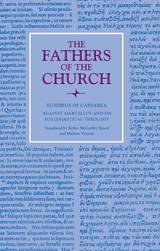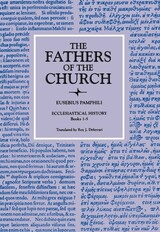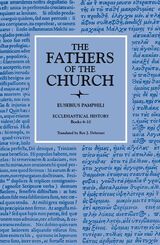
On Ecclesiastical Theology, composed circa 338/339 just before Eusebius’s death, and perhaps in response to the amnesty for deposed bishops enacted by Constantius after the death of Constantine in 377 and the possibility of Marcellus’s return to his see, continues to lay out the criticisms initially put forward in Against Marcellus, again utilizing quotations from Marcellus’s book against Asterius. However, we see in this text a much more systematic explanation of Eusebius’s objections to the various elements of Marcellus’s theology and what he sees as the proper orthodox articulation of those elements.
Long overlooked for statements at odds with later orthodoxy, even written off as heretical because allegedly “semi-Arian,” recent scholarship has demonstrated the tremendous influence these texts had on the Greek theological tradition in the fourth century, especially on the orthodox understanding of the Trinity. In addition to their influence, they are some of the few complete texts that we have from Greek theologians in the immediate period following the Council of Nicea in 325, thus filling a gap in the materials available for research and teaching in this critical phase of theological development.



The first comprehensive history of early Christianity.
Eusebius of Caesarea (ca. AD 260–340), born in Palestine, was a student of the presbyter Pamphilus, whom he loyally supported during Diocletian’s persecution. He was himself imprisoned in Egypt, but became Bishop of Caesarea around 314. At the Council of Nicaea in 325 he sat by the emperor, led a party of moderates, and made the first draft of the famous creed.
Of Eusebius’ many learned publications we have the Martyrs of Palestine and the Life of Constantine; several apologetic and polemic works; parts of his commentaries on the Psalms and Isaiah; and the Chronographia, known chiefly in Armenian and Syriac versions of the original Greek. But Eusebius’ chief fame rests on the History of the Christian Church in ten books, published in 324–325, the most important ecclesiastical history of ancient times, a great treasury of knowledge about the early Church.

The first comprehensive history of early Christianity.
Eusebius of Caesarea (ca. AD 260–340), born in Palestine, was a student of the presbyter Pamphilus, whom he loyally supported during Diocletian’s persecution. He was himself imprisoned in Egypt, but became Bishop of Caesarea around 314. At the Council of Nicaea in 325 he sat by the emperor, led a party of moderates, and made the first draft of the famous creed.
Of Eusebius’ many learned publications we have the Martyrs of Palestine and the Life of Constantine; several apologetic and polemic works; parts of his commentaries on the Psalms and Isaiah; and the Chronographia, known chiefly in Armenian and Syriac versions of the original Greek. But Eusebius’ chief fame rests on the History of the Christian Church in ten books, published in 324–325, the most important ecclesiastical history of ancient times, a great treasury of knowledge about the early Church.

THIS EDITION HAS BEEN REPLACED BY A NEWER EDITION.
Novel and biography are joined in this literary work with a historical core. Philostratus' life of the first century mystic from Tyana was written at the request of the empress Julia Domna. It portrays a man with supernatural powers, a Pythagorean who predicts the future, cures the sick, raises the dead, and himself prevails over death, ascending to heaven and later appearing to disciples to prove his immortality. The account has a rich and varied setting: Apollonius' ministering carries him throughout the eastern Mediterranean world, as far south as Ethiopia, and eastward to India. Philostratus' Life of Apollonius was long viewed by Christians as a dangerous attempt to set up a Christ-like rival.
This two-volume edition of the Life of Apollonius of Tyana includes, in the second volume, a collection of Apollonius' letters and a treatise by the Christian bishop and historian Eusebius attacking Apollonius as a charlatan.
Also available by Philostratus 'the Athenian' in the Loeb Classical Library is his Lives of the Sophists, a treasury of information about notable sophists that yields a good picture of the predominant influence of Sophistic in the educational, social, and political life of the Empire in the 2nd and 3rd centuries.
READERS
Browse our collection.
PUBLISHERS
See BiblioVault's publisher services.
STUDENT SERVICES
Files for college accessibility offices.
UChicago Accessibility Resources
home | accessibility | search | about | contact us
BiblioVault ® 2001 - 2024
The University of Chicago Press









